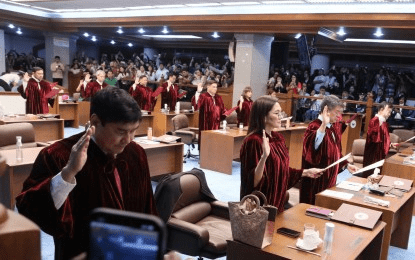By Wilnard Bacelonia

MANILA – The Senate on Tuesday formally convened as an impeachment court, with 22 senators taking their oath as judges in the historic trial of Vice President Sara Z. Duterte.
Senate President Francis “Chiz” Escudero, serving as presiding officer, led the oath-taking ceremony, marking the chamber’s assumption of its constitutional mandate to try the impeachment complaint transmitted by the House of Representatives.
Moments after the Senate organized itself, Senator Ronald “Bato” dela Rosa delivered a lengthy privilege speech questioning the constitutionality of the impeachment complaint.
He moved for its outright dismissal, citing what he described as serious procedural lapses, including the delayed action on earlier impeachment filings and the last-minute transmittal of a fourth complaint that bypassed the supposed one-year ban.
“In view of its constitutional infirmities and questions on the jurisdiction and authority of the 20th Congress, I respectfully move that the verified impeachment complaint against Vice President Sara Zimmerman Duterte be dismissed,” Dela Rosa said.
But the motion was met with opposition from other senators, including Senator Risa Hontiveros, who argued that the Rules of Procedure on Impeachment Trials did not allow a senator-judge to raise such a motion.
She added that any motion to dismiss should come from the respondent, not from the court.
“A motion to dismiss is not found. Hindi po nahahanap itong motion to dismiss sa Rules of Procedure on Impeachment na literal kaka-adopt lang po natin. At kung mayroon man, hindi senator-judge ang magraraise noon kundi ang defendant (This motion to dismiss cannot be found in the Rules of Procedure on Impeachment that we literally just adopted. And if there is one, it would not be a senator-judge who would raise it, but the defendant),” Hontiveros said.
Citing the Ang Tibay doctrine, she emphasized that due process requires both the prosecution and the defense to be heard before the court can rule on any dispositive motion.
Hontiveros urged the Senate to first notify the parties and allow them to comment on Dela Rosa’s motion before proceeding.
Senator Alan Peter Cayetano, sitting as a senator-judge, intervened in the discussion and suggested three possible courses of action: dismiss the complaint, remand it, or allow the proceedings to continue the following day.
He said that while Dela Rosa had the right to maintain his motion, the court should tread carefully.
“I cannot in conscience say that we decide today that it violated the one-year ban rule,” Cayetano said.
He noted that there was already a Supreme Court ruling on the matter, but questioned whether the prosecution was ready and whether the 20th Congress could legally carry forward the trial.
Cayetano warned that dismissing the complaint outright could lead the House to simply refile it, while a remand to the House might at least prompt further deliberation.
Proceeding immediately, on the other hand, could push the trial into a constitutional gray area once the 19th Congress ends and the new Congress begins.
“If we dismiss, ibabalik din nila. Pag remand, may mangyayari (they will also return it. If remanded, something will happen),” Cayetano said.
He added that the Senate could ask the House to certify that the impeachment did not violate the one-year rule and let the 20th Congress decide how to proceed. Until then, he said, it may be prudent to delay a final ruling on the motion.
On Feb. 5, the House of Representatives voted to impeach Duterte, marking the first time a sitting vice president in the post-EDSA People Power era has been put on the verge of removal. (PNA)





